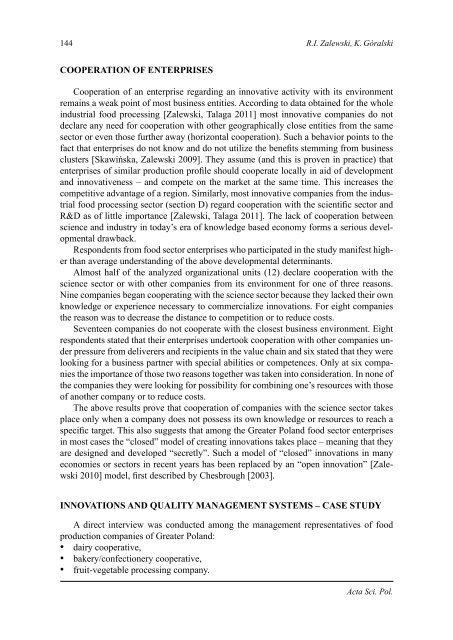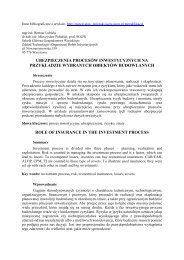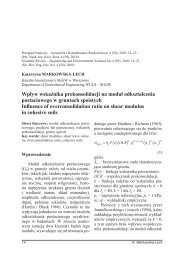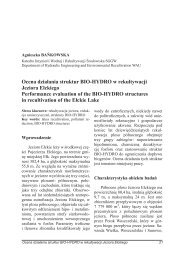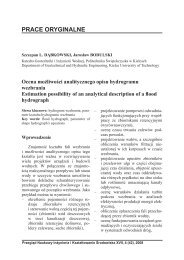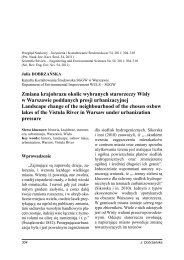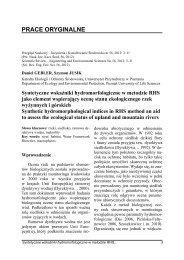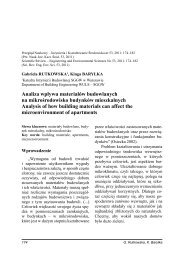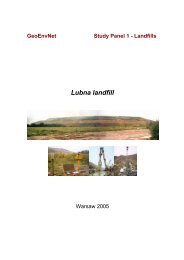ACTA SCIENTIARUM POLONORUM - SGGW
ACTA SCIENTIARUM POLONORUM - SGGW
ACTA SCIENTIARUM POLONORUM - SGGW
You also want an ePaper? Increase the reach of your titles
YUMPU automatically turns print PDFs into web optimized ePapers that Google loves.
144 R.I. Zalewski, K. GóralskiCOOPERATION OF ENTERPRISESCooperation of an enterprise regarding an innovative activity with its environmentremains a weak point of most business entities. According to data obtained for the wholeindustrial food processing [Zalewski, Talaga 2011] most innovative companies do notdeclare any need for cooperation with other geographically close entities from the samesector or even those further away (horizontal cooperation). Such a behavior points to thefact that enterprises do not know and do not utilize the benefits stemming from businessclusters [Skawińska, Zalewski 2009]. They assume (and this is proven in practice) thatenterprises of similar production profile should cooperate locally in aid of developmentand innovativeness – and compete on the market at the same time. This increases thecompetitive advantage of a region. Similarly, most innovative companies from the industrialfood processing sector (section D) regard cooperation with the scientific sector andR&D as of little importance [Zalewski, Talaga 2011]. The lack of cooperation betweenscience and industry in today’s era of knowledge based economy forms a serious developmentaldrawback.Respondents from food sector enterprises who participated in the study manifest higherthan average understanding of the above developmental determinants.Almost half of the analyzed organizational units (12) declare cooperation with thescience sector or with other companies from its environment for one of three reasons.Nine companies began cooperating with the science sector because they lacked their ownknowledge or experience necessary to commercialize innovations. For eight companiesthe reason was to decrease the distance to competition or to reduce costs.Seventeen companies do not cooperate with the closest business environment. Eightrespondents stated that their enterprises undertook cooperation with other companies underpressure from deliverers and recipients in the value chain and six stated that they werelooking for a business partner with special abilities or competences. Only at six companiesthe importance of those two reasons together was taken into consideration. In none ofthe companies they were looking for possibility for combining one’s resources with thoseof another company or to reduce costs.The above results prove that cooperation of companies with the science sector takesplace only when a company does not possess its own knowledge or resources to reach aspecific target. This also suggests that among the Greater Poland food sector enterprisesin most cases the “closed” model of creating innovations takes place – meaning that theyare designed and developed “secretly”. Such a model of “closed” innovations in manyeconomies or sectors in recent years has been replaced by an “open innovation” [Zalewski2010] model, first described by Chesbrough [2003].INNOVATIONS AND QUALITY MANAGEMENT SYSTEMS – CASE STUDYA direct interview was conducted among the management representatives of foodproduction companies of Greater Poland:• dairy cooperative,• bakery/confectionery cooperative,• fruit-vegetable processing company.Acta Sci. Pol.


